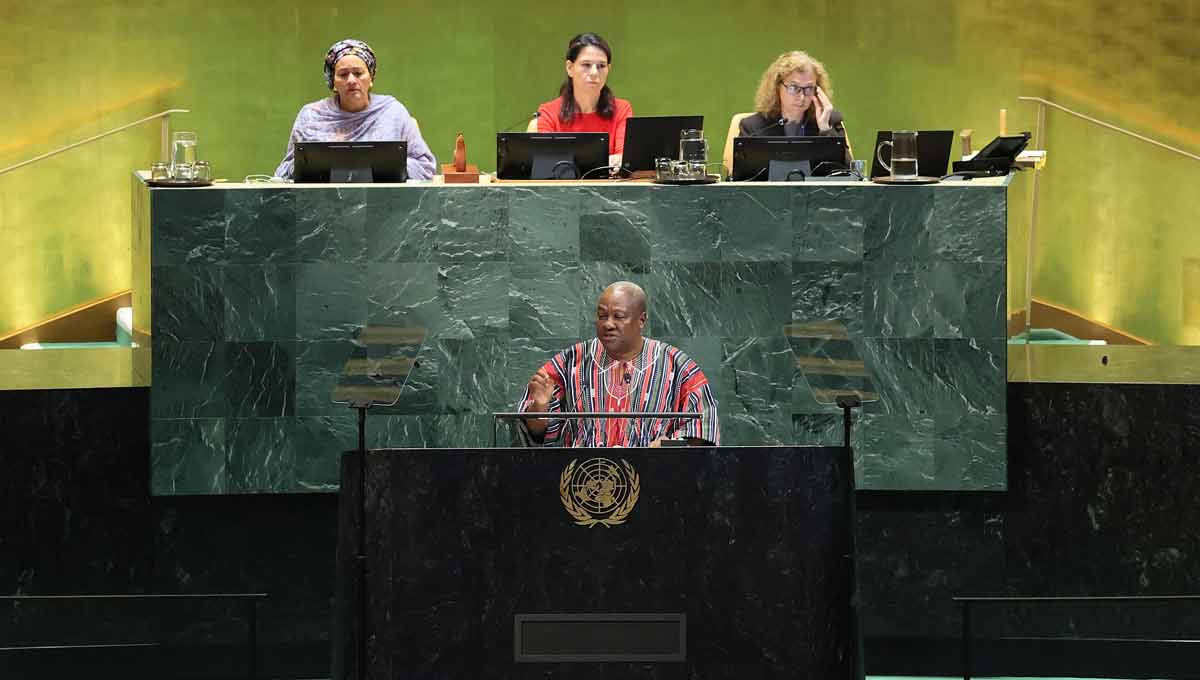By Jeffery Kazembe Batts
IG: @kazbatts
President of Ghana John Dramani Mahama and President of Kenya William Ruto came to NYC to address the assembled diplomats at the General Assembly among other agenda items. The Ghanian and Kenyan leaders took advantage of the stage and came with words that if manifested into policy, could change the socio-political conditions of millions of people around the world by adding African nations to the highest decision-making body of the world’s most inclusive institution.
Wearing a mostly red with blue, grey and white striped dashiki Ghanian President Mahama said in 1945 the role of African nations in the founding of the United Nations was insignificant with only Egypt, Ethiopia, Liberia and South Africa at the table. Prior to the United Nations and formed because of World War 1, the League of Nations was set up to prevent major wars in the future. It failed miserably as World War 2 evolved during the 1930’s.
Mahama then went back further recalling the Berlin Conference and the “scramble for Africa” among the European nations. This imperialist burden of exploitation during the 19th & 20th centuries weakened Africa and led to the miniscule African input during the founding of both the League and the U.N. Mahama urged the diplomats to now recognize that “the future of the world is African” he enthusiastically repeated. “When it comes to representation in this august assembly the most powerful post-World War 2 nations are still being rewarded with an almost totalitarian guardianship over the rest of the world.” he pleaded.
Hands clasped in front, the president then humbly asked for one permanent seat on the security council for Africa with full rights and an end to veto power being absolute and restricted to only five nations. Mahama then reminded the diplomatic delegations that 30 years ago at the same podium former South African President Nelson Mandela said “the United Nations has to reassess its role, redefine its profile, reshape its structures, it should truly reflect the diversity of our universe and ensure equity among the nations and the exorcise of power within the system of international relations in general and the security council in particular.”
Clad in a blue blazer with white shirt and red tie, early in his speech Kenyan President Ruto also reminded all about the failure of the League of Nations. He then declared the purpose of the U.N., eighty years ago, was to promote collective global security, disarmament, peaceful dispute resolution, and build cooperation on social and humanitarian issues between the nations of the world. Ruto also explained the urgent need for change that allows for African leadership at the highest levels within United Nations decision making.
Ruto then added “History is a lesson and a warning. Institutions rarely fail because they lack vision or ideals, more often they drift into irrelevance when they do not adapt, when they hesitate to act, and when they lose legitimacy, to remain relevant institutions must be reimagined, must be reformed, renewed and aligned with emerging realities.”
Continuing Ruto asked “Is the United Nations relevant to the demands of our time? Can it continue to serve humanity in the face of current realities or has it become a relic of a by-gone era?” He reminded the gathering that twenty years ago the continent was unified on the way forward. Adopted in early 2005 by the African Union, the Ezulwini Consensus demands two permanent and five non-permanent African seats on a reformed UN Security Council, with full veto powers for all permanent seats. In an assertive tone Ruto’s was forceful in demanding that the Ezulwini Consensus be respected.
Both presidents highlighted the enormous suffering by the people of Sudan where currently a humanitarian catastrophe with 12 million refugees is happening while garnering insignificant global media attention. Ghana president Mahama stressed the need for the U.N. to help the suffering refugees.
“It is not a mystery that when leaders of Western nations complain of their migration problems they are often referring to immigrants from global South” Mahama said in comparing global response differences between Ukraine and Sudan refugees. Hoping for peace in Sudan Ruto stated, “We fully endorse the QUAD, consisting of Egypt, Saudi Arabia, the United Arab Emirates and the United States in affirming that there cannot be a military solution and only political dialogue provides a viable path forward.”
Although climate change & the urgent need to reform and create fair global financial institutions were mentioned the urgency of Security Council reform was the common demand by the two statesmen. Both said the time for building African empowerment by joining the Security Council is long overdue.
So how can Africans force the overdue issue of permanent security council membership to be dealt with? Although strongly implied as to what might happen, neither of the two presidents during their presentations offered a specific action plan for the African Union or a timeline for responses from the current security council.
It has been 30 years since Mandela stated the need and 20 years since Ezulwini codified the process, yet the continent and leaders are still asking the same question. Can the current security council members ever agree to African seats at a table of power? Next year will African leaders and nations even want to speak and attend the 81st United Nations General Assembly?
